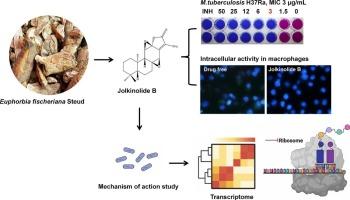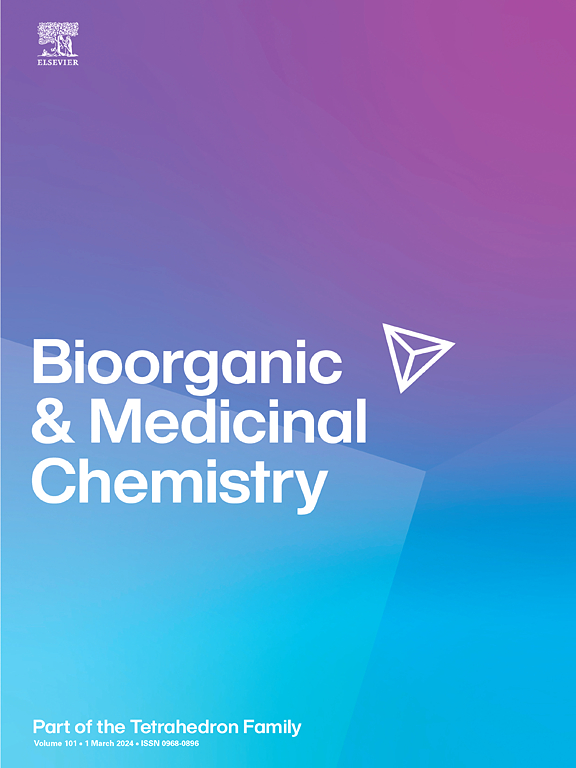Jolkinolide B通过下调核糖体蛋白和干扰蛋白合成抑制分枝杆菌生长
IF 3
3区 医学
Q2 BIOCHEMISTRY & MOLECULAR BIOLOGY
引用次数: 0
摘要
中药大戟(Euphorbia fischeriana Steud)长期用于治疗淋巴结结核(TB)。本研究表明,鱼氏双歧杆菌(E. fischeriana)成分Jolkinolide B对M. tuberculosis H37Ra具有抑菌活性,最低抑菌浓度(MIC)为3 μg/mL。此外,在2 × MIC浓度下,对感染M. tuberculosis的RAW264.7巨噬细胞有杀菌作用。通过转录组的机制研究发现,Jolkinolide B显著降低了17种核糖体蛋白的转录,从而抑制了结核分枝杆菌的蛋白质合成。RT-qPCR证实Jolkinolide B以浓度依赖的方式降低分枝杆菌核糖体蛋白的表达。形态学观察表明,Jolkinolide B使结核杆菌变短、变形。本研究发现了一种来自鱼芽胞杆菌的天然化合物,并阐明了其抗结核作用机制,为合理使用中药和抗生素治疗结核病提供了依据。本文章由计算机程序翻译,如有差异,请以英文原文为准。

Jolkinolide B inhibits mycobacterial growth by down-regulating ribosomal proteins and interfering with protein synthesis
The traditional Chinese medicine Euphorbia fischeriana Steud (E. fischeriana) has been used for treating lymph node tuberculosis (TB) for a long time. This study demonstrates that Jolkinolide B, a component of E. fischeriana, exhibits antimycobacterial activity with a minimum inhibitory concentration (MIC) of 3 μg/mL against M. tuberculosis H37Ra. Additionally, it shows bactericidal effect on RAW264.7 macrophages infected with M. tuberculosis at a concentration of 2 × MIC. Mechanistic study via transcriptome revealed that Jolkinolide B significantly reduced the transcription of 17 ribosomal proteins, thereby inhibiting protein synthesis in M. tuberculosis. RT-qPCR confirmed that Jolkinolide B decreased the expression of mycobacterial ribosomal proteins in a concentration-dependent manner. Finally, morphological observations indicated that Jolkinolide B caused the tubercle bacilli to become shorter and deformed. This study highlights a natural compound from E. fischeriana and clarifies its mechanism of action against TB, supporting the rational use of traditional Chinese medicine (TCM) and antibiotics in TB treatment.
求助全文
通过发布文献求助,成功后即可免费获取论文全文。
去求助
来源期刊

Bioorganic & Medicinal Chemistry
医学-生化与分子生物学
CiteScore
6.80
自引率
2.90%
发文量
413
审稿时长
17 days
期刊介绍:
Bioorganic & Medicinal Chemistry provides an international forum for the publication of full original research papers and critical reviews on molecular interactions in key biological targets such as receptors, channels, enzymes, nucleotides, lipids and saccharides.
The aim of the journal is to promote a better understanding at the molecular level of life processes, and living organisms, as well as the interaction of these with chemical agents. A special feature will be that colour illustrations will be reproduced at no charge to the author, provided that the Editor agrees that colour is essential to the information content of the illustration in question.
 求助内容:
求助内容: 应助结果提醒方式:
应助结果提醒方式:


